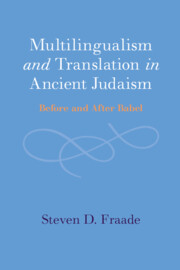Refine search
Actions for selected content:
2 results
12 - Wordplay
-
- Book:
- The Prompts You Need to Help You Write the Book You Want to Write
- Published online:
- 25 October 2025
- Print publication:
- 06 November 2025, pp 167-184
-
- Chapter
- Export citation

Multilingualism and Translation in Ancient Judaism
- Before and After Babel
-
- Published online:
- 01 August 2023
- Print publication:
- 21 September 2023
